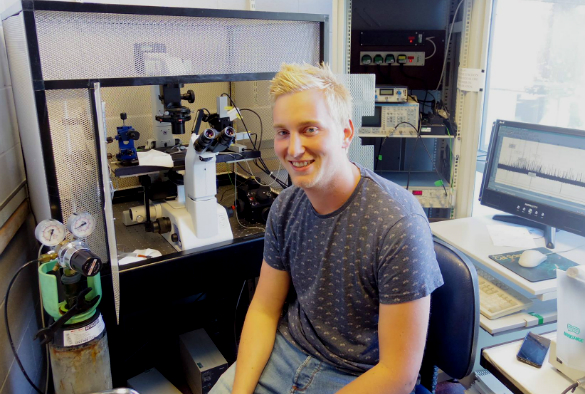Edd Humphries is a PhD student at the University’s Institute of Integrative Biology.
“My project is about understanding the delivery of blood to tissues. Blood vessels constantly change their diameter to match blood flow to tissue needs for oxygen and these adjustments are made by the contraction and relaxation of muscle cells within the blood vessel walls.
Understanding the mechanisms that trigger these muscle cells to contract and relax is important for understanding how the body works under normal circumstances and also in understanding the development of diseases like high blood pressure when blood vessels can be too contracted.
Our laboratory has recently shown that activation of a protein called Epac (Exchange Protein directly Activated by cAMP) within arterial muscle cells causes widening of arteries. Part of my project has been mapping the chain of proteins within cells that links Epac activation to muscle relaxation. One of the ‘links’ in this chain is an ion channel protein that controls the flow of electricity across the muscle cell membrane. Epac is able to open these ion channels, allowing tiny electrical currents to flow out of the cell and ultimately inducing relaxation.
Exploring this mechanism means I spend most of my time in the lab (which is why I signed up) undertaking standard biochemistry techniques such as western blotting alongside more specialist and demanding technologies such as patch clamp electrophysiology. ‘Patch clamping’ involves putting a small glass electrode against the cell surface and measuring the tiny electrical currents (about a million millionth of an Amp!) that flow in and out of the cell through ion channel proteins. This is really time-consuming and difficult but is probably the only time that you get to watch a protein working in real-time in its normal environment.
As reported regularly in the news, high blood pressure (hypertension) is becoming more common, and with it so are more cardiovascular diseases. I hope that by unravelling the mechanisms that control the way arterial muscle cells behave my PhD research will prove helpful towards the treatment or even cure of cardiovascular diseases.
My PhD is funded through a BBSRC Doctoral Training Programme (DTP) studentship. The DTP is a new initiative between the Universities of Liverpool, Newcastle and Durham which aims to produce well-rounded scientists.
The great thing for me about this program is that it includes a Professional Internship for PhDs (PIPS). For my placement, I arranged to go to Copenhagen in Denmark to work with a company called Acesion Pharma – a small biotech company that is working towards a drug treatment for atrial fibrillation (irregular electrical activity in part of the heart). The placement gave me so many opportunities such as industrial networking, gaining an insight into the industrial science work life and also forming international collaborations.”
For more information about the BBSRC Doctoral Training Programme (DTP) please visit: http://www.nld-dtp.org.uk
Save
